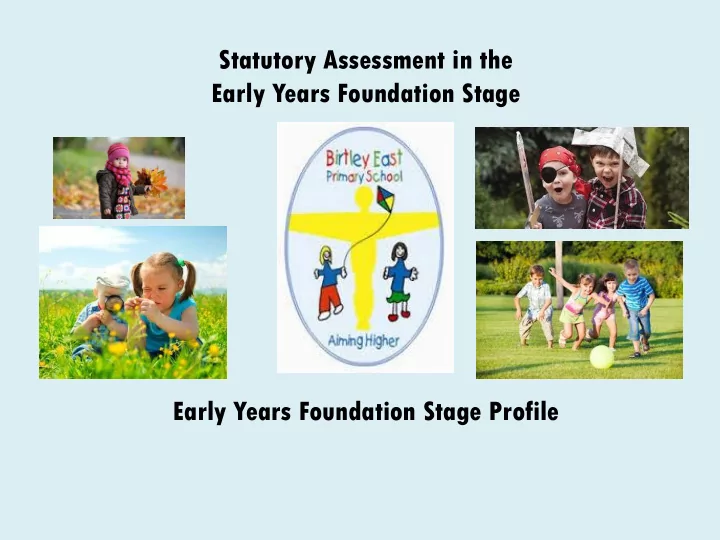

Statutory Assessment in the Early Years Foundation Stage Early Years Foundation Stage Profile
How are children assessed in Reception Class? • The EYFS is broken down into age bands, called Development Matters bands : 0-11 months, 8-20 months, 16-26 months, 22-36 months, 30-50 months and 40-60 months. • For each age band, and each area of learning, there is a series of statements relating to a child’s development: for example, ‘notices simple shapes and patterns in pictures’. Teachers will tick off these developmental statements as they see your child demonstrating them.
• Assessment is ongoing throughout the EYFS, but the official EYFS Profile for each child is completed in the final term of Reception . The assessment is submitted to the LA and to the Government. • The Government doesn’t specify what form the assessment should take, but generally, it takes place through teacher observation of children’s learning and development as they take part in everyday activities, and planned observations, where teachers spend time on a specific task with an individual child or small group. • Parents and other carers (such as childminders) can also contribute to the Profile, for example by adding comments to the child’s Home Learning Journal, Reading record or by sharing information with the Reception class teacher.
How accurate is the assessment? • To ensure that EYFS levels are consistent within schools and nationally, the Profile is subject to moderation. This happens both internally, for example with other teachers and the Head Teacher, and externally, with the Local Authority taking a sample of a school’s Profiles to moderate. Schools are externally moderated at least once every four years.
Early Years Foundation Stage Profile • Reception teachers are required to make a judgement about children’s learning and development against the 17 Early Learning Goals at the end of the year. This forms their Early Years Foundation Stage Profile. • The Early Years Foundation Stage Profile report that your child’s Reception you will receive at the end of year summarises and describes children’s attainment at the end of the EYFS. • It is based on on-going observation and assessment in the three prime and four specific areas of learning, and the three learning characteristics (Playing and Exploring, Active Learning, Creating and Thinking Critically).
The 17 Early Learning Goals Prime Area of Learning : Communication and Language ELG 1 Listening and Attention ELG 2 Understanding ELG 3 Speaking Prime Area of Learning: Physical Development ELG 4 Moving and Handling ELG 5 Health and Self Care Prime Area of Learning : Personal, Social and Emotional Development ELG 6 Self Confidence and Self Awareness ELG 7 Managing Feelings and Behaviour ELG 8 Making Relationships Specific Area of Learning: Literacy ELG 9 Reading ELG 10 Writing Specific Area of Learning: Mathematical Development ELG 11 Number ELG 12 Space, Shape and Measures Specific Area of Learning: Understanding the World ELG 13 People and Communities ELG 14 The World ELG 15 Technology Specific Area of Learning :Expressive Arts and Design ELG 16 Using Media and Materials ELG 17 Being Imaginative
For each ELG, the Reception class teacher must judge whether a pupil is • Expected : meeting the level of development expected at the end of the reception year. • Exceeding: exceeding this level. (If your child is exceeding the expected level at the end of Reception, your child’s teacher will liaise with hi reception teacher and ensure that he is adequately challenged in his Year 1 class). • Emerging: not yet reaching this level. (If your child is working below the level expected for his age, the school will focus on helping him catch up with his peers. This could be through targeted support from a teacher or teaching assistant, small-group work with children who have similar needs, or, where necessary, additional assistance, for example from the school’s Special Educational Needs Co-ordinator or external services such as the speech and language therapy team).
• Your child’s teacher will award him one of these levels for each of the seven EYFS areas of learning. • On leaving the Foundation Stage at the end of Reception, a child is considered to have a ‘good level of development’ if they have achieved at least the expected level in the Early Learning Goals in all aspects of Personal, Social and Emotional Development, Physical Development, Communication and Language, Literacy and Mathematics .
• The main purpose of the EYFS profile is to provide a reliable, valid and accurate assessment of individual pupils at the end of the EYFS. • EYFS profile data is used to: - inform parents about their child’s development against the ELGs and the characteristics of their learning - support a smooth transition to key stage 1 (KS1) by informing the professional dialogue between EYFS and KS1 teachers - help Year 1 teachers plan an effective, responsive and appropriate curriculum that will meet the needs of all pupils • In addition, the EYFS profile provides an accurate national data set relating to levels of child development at the end of the EYFS. The DfE uses this to monitor changes in levels of children’s development and their readiness for the next phase of their education both nationally and locally.
Working together to complete your child’s EYFSP • Sharing information with your child’s Reception class teacher through Home Learning Journals, Reading Record comments and talking to us about what your child has been learning at home. • Parent/Teacher Evening share your child’s current development matters profile and find out if there are any areas in which you can support your child.
Celebrate where your child is on their individual learning and development journey. They all learn in different ways and at different rates! Thank you for your continued support! Useful website: www.4children.org.uk Publication: What to expect when
Recommend
More recommend